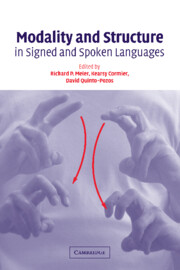Book contents
- Frontmatter
- Contents
- List of figures
- List of tables
- List of contributors
- Acknowledgements
- 1 Why different, why the same? Explaining effects and non-effects of modality upon linguistic structure in sign and speech
- Part I Phonological structure in signed languages
- Part II Gesture and iconicity in sign and speech
- Part III Syntax in sign: Few or no effects of modality
- Part IV Using space and describing space: Pronouns, classifiers, and verb agreement
- 13 Pronominal reference in signed and spoken language: Are grammatical categories modality-dependent?
- 14 Is verb agreement the same crossmodally?
- 15 The effects of modality on spatial language: How signers and speakers talk about space
- 16 The effects of modality on BSL development in an exceptional learner
- 17 Deictic points in the visual–gestural and tactile–gestural modalities
- Index
- References
14 - Is verb agreement the same crossmodally?
Published online by Cambridge University Press: 22 September 2009
- Frontmatter
- Contents
- List of figures
- List of tables
- List of contributors
- Acknowledgements
- 1 Why different, why the same? Explaining effects and non-effects of modality upon linguistic structure in sign and speech
- Part I Phonological structure in signed languages
- Part II Gesture and iconicity in sign and speech
- Part III Syntax in sign: Few or no effects of modality
- Part IV Using space and describing space: Pronouns, classifiers, and verb agreement
- 13 Pronominal reference in signed and spoken language: Are grammatical categories modality-dependent?
- 14 Is verb agreement the same crossmodally?
- 15 The effects of modality on spatial language: How signers and speakers talk about space
- 16 The effects of modality on BSL development in an exceptional learner
- 17 Deictic points in the visual–gestural and tactile–gestural modalities
- Index
- References
Summary
Introduction
One major question in linguistics is whether the universals among spoken languages are the same as those among signed languages. Two types of universals have been distinguished: formal universals, which impose abstract conditions on all languages, and substantive universals, which fix the choices that a language makes for a particular aspect of grammar (Chomsky 1965; Greenberg 1966; Comrie 1981). It would be intriguing to see if there are modality differences in both types of universals. Fischer (1974) has suggested that formal universals like some syntactic operations apply in both modalities, while some substantive universals are modality specific. Similarly, Newport and Supalla (2000:112) have noted that signed and spoken languages may have some different universals due to the different modalities.
In this chapter we focus on verb agreement as it provides a window into some of the universals within and across the two modalities. We start with a working definition of agreement for spoken languages and illustrate the difficulty in applying such a definition to signed languages. We then embark on two goals: to investigate the linguistic status of verb agreement in signed language and to understand the architecture of grammar with respect to verb agreement. We explore possible modality differences and consider their effects on the nature of the morphological processes involved in verb agreement. Finally, we return to the formal and substantive universals that separate and/or group spoken and signed languages.
Information
- Type
- Chapter
- Information
- Modality and Structure in Signed and Spoken Languages , pp. 370 - 404Publisher: Cambridge University PressPrint publication year: 2002
References
Accessibility standard: Unknown
Why this information is here
This section outlines the accessibility features of this content - including support for screen readers, full keyboard navigation and high-contrast display options. This may not be relevant for you.Accessibility Information
- 42
- Cited by
